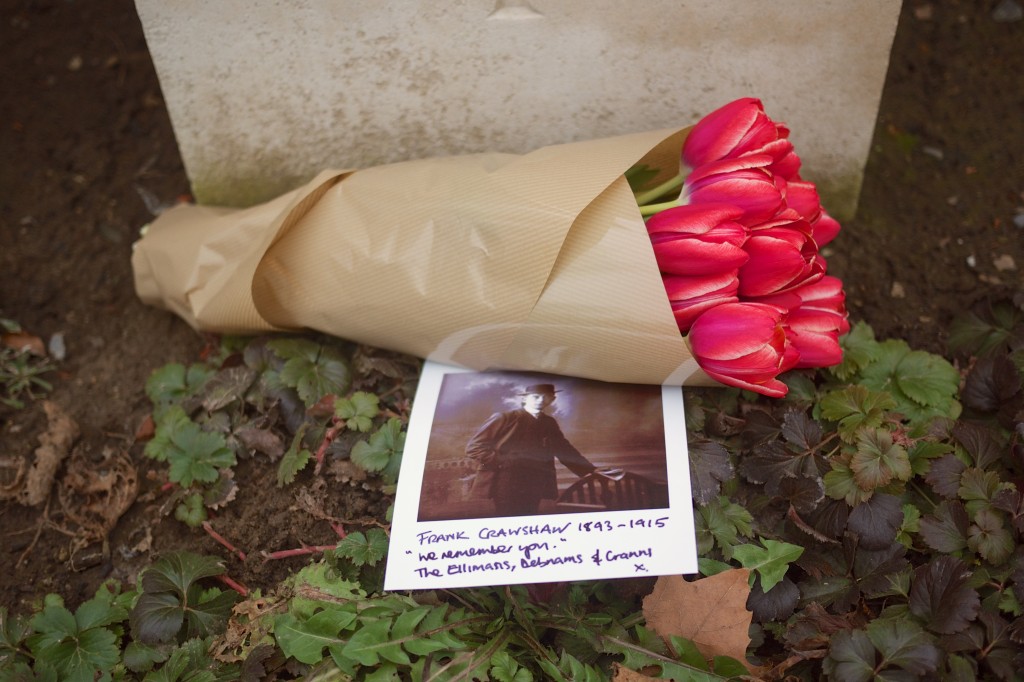11th February 1915

Frank was killed today.
It’s hard to specify a time, but during the day the Germans shelled the British support lines and dugouts. Eight men were hit in separate incidents at 10.30am and 3pm. Two men died. One was Frank, the other was (Acting) Corporal Francis Alfred Jones from Cheshire. The shells were high explosive says the Dorsets’ diary. At least it would have been quick for one of them. The 15th Brigade’s diary lists 7 injured and only one killed so can we assume one died later of wounds? Jones is listed on the Menin Gate. Which usually means that his body was never found.
Frank was originally buried in a cemetery in Frenchman’s Farm. This cemetery was destroyed in later fighting. May we infer that Frank may have died in a dressing station, which Frenchman’s Farm was at some point. Frank now lies in Wulverghem-Lindenhoek Military Cemetery but his grave is only a marker, as far as I can make out, with six other graves that somehow survived the later destruction.
It’s easy to try to find reasons why and how it happened. But frankly, if you’ll excuse the pun, the odds were against him. Frank was one of a dwindling number of original members of the 1st Bn Dorsets that set out from Victoria barracks on August 14th 1914. I haven’t researched the casualties in terms of ordinary soliders but Gleichen makes a note that, of the 127 officers who came out with him to France with the 15th Brigade, all that remained were:
Norfolks—Done and Bruce (both ill in hospital from strenuous overwork), Megaw (killed later), Paterson.
Dorsets—Ransome, Partridge.
Bedfords—Griffith (trustiest of C.O.’s, who had been under heavier fire than almost any one in the Brigade, yet never touched), Allason (thrice wounded), Gledstanes (killed later).
Cheshires—Frost (killed later)
I’ve come to Belgium today to pay my respects to these men as well as Frank, my great great uncle. But I also want to see and walk the landscape he fought in. I’ve been to Ypres a couple of times (in 2005 and 2010) but I didn’t know anything about Frank’s life, or the history of the Dorsetshire Regiment. I think I know a little bit more now.
As you drive inland from the channel ports the pancake-flat landscape suddenly buckles up to the south as you approach the turning for Poperinge on the A25. It was at that moment that I finally understood why the Ypres Salient was so important to the British. Beyond this point there was no cover to the north, which meant no breaks in the landscape, behind which to hide a battery of guns or reserve troops. Jump forward 25-odd years to 1940 and you see what happens when the Germans break through.
And yet the landscape also made the salient incredibly dangerous. A salient is inherently lethal in itself but Ypres was special as it has hills which, in early 1915, the Germans held. They could fire down on the enemy as well as conceal guns behind those hills. Forty nine other men were killed in and around Ypres on the 11th February 1915. The British had no real cover from which to hide their men and so they suffered casualties like waves pick up and turn over shells on a beach. The attritional damage inflicted on the British during the early part of 1915 took a long time for them to recover from.
Wulvergem, as it’s now known, lies in a depression in gently undulating land dominated by Mont Kemmel in the North and Messines in the South. I see now that the Germans commanded every vantage point, invisible over the crest of a slope, and they were able to pour fire into easily visible targets, including the barns and farms that litter the landscape even today.
It’s pretty hard to discern between a scruffy barn an one that’s had a couple of shells through it. The trees are all pollarded here, raggedy scarecrows in the pale winter light. Frank was fighting in a landscape he’d recognise today. It’s only later, when the villages and towns were destroyed by the bigger siege guns, that the landscape shifted from tattered to torn apart.
Tomorrow I will walk across this landscape but this is the last daily post I’ll be making. Thanks for coming on this journey with me. I’m off for a cold tea.
Lest we forget.
Jonathan Elliman
Ypres 2015